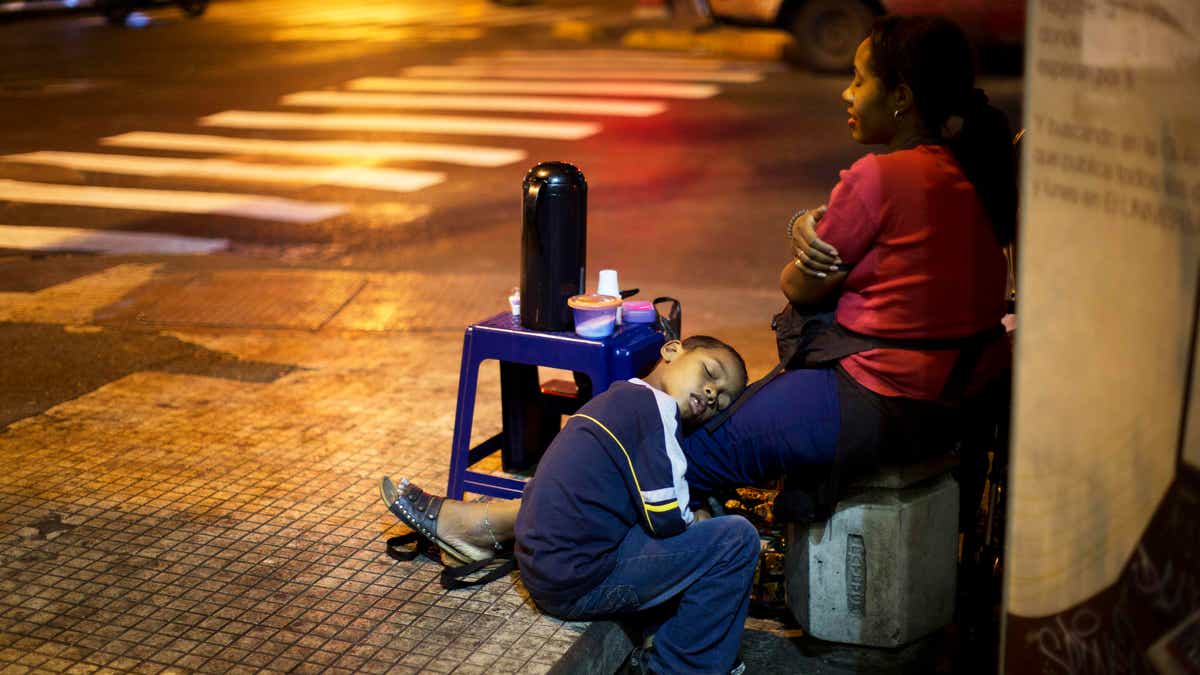
A child sleeps on the legs of his mother, who sells coffee in downtown Caracas, on March 4, 2014. (ap)
Venezuelans used to say prices rose in elevators while salaries climbed stairs. Today salaries are still on the stairs, but prices ride jets as the impact of runaway inflation hits the nation with the crushing speed of a supersonic jet.
One year ago, Isabel, a live-in maid from Colombia made around US$1.000 a month, plus room and board in Caracas, and was able to send some US$600 back to her children at home under a subsidized foreign exchange system. No longer. Isabel's entire monthly wages now add up to no more than US$90 and are dropping. She now plans to go back to Colombia despite scarce jobs there.
The insane distortion underlines just how the fake Venezuelan "socialist revolution" grinds down the man in the street and makes it an irresponsible joyride for Venezuela's ostentatious nouveau riche "bolibourgeois" oligarchs.
Isabel may escape back home, just as many of young Venezuelans are leaving the country — but 90 percent of those who leave are university graduates and most people in this nation of more than 28 million do not have that option: They must stay and live with an inflation that this year tops Colombia's compounded rate for the past 8 years.
Serious economists predict an oncoming and inescapable perfect economic storm, as "bolivarian" hacks parrot the party line and live in constant denial — but to the man on the street the hard facts hammer home on a daily basis with the strength of a sledge hammer.
August this year closed with the greatest inflationary jump in 18 years. The cost of living has gone up 101 percent over the past 16 months. According to figures disclosed by the Central Bank, the average price of food and non-alcoholic beverages skyrocketed 210 percent in August 2012 - August 2014.
Year to date, food and non-alcoholic beverages have increased by 91 percent, housing by 55 percent, leisure and entertainment by 50 percent, transportation by 48 percent, clothing and apparel by 46 percent, health services by 36 percent and schools by 32 percent. The effect is devastating lower income families.
Venezuela's current inflationary cataclysm is shown on a recent chart based on highly manipulated data from the nation's Central Bank:
The respected Teachers Union's economic research unit reports the average monthly cost of a basic food basket for a normal family is now 21,572 bolivars. At the official exchange rate, which is used in government fiction, that would come to US$3,425.
This in a country where the minimum monthly wage is 4,251 bolivars – US$ 675, should you insist on remaining within a sort of fantasyland created by the National Statistics Institute – run by an old diehard communist apparatchik and accepted by some unquestioning international organizations such as the UN's Food and Agriculture Organization.
Another source shows that 25,506 bolivars are required to fully fit out a child for school this year. That's US$ 4,050 or US$ 255, depending on which exchange rate you live by within a insane, convoluted and corrupt system which has two additional "official" exchange rates for travelers and selected importers.
On the parallel market, which actually decides real prices for what can be actually bought in a sea of growing scarcity, the current minimum wage brings in around U$ 42.50 per month and dropping.
But if you are one of the very fortunate – no more than 1 percent of the population who have their own dollar disposable income – US$1,000 will bring you up to 100,000 bolivars and rising, which means your monthly family food bill for basic products is around a mere US$ 215, and you can equip your child for school this year for US$ 255.
The insane distortion underlines just how the fake Venezuelan "socialist revolution" grinds down the man in the street and makes it an irresponsible joyride for Venezuela's ostentatious nouveau riche "bolibourgeois" oligarchs.
The callous Maduro regime is far more interested in political survival than the well-being of Venezuelans, and its hard core believes it has to keep people begging and fully dependent on government handouts for their day to day survival.
Tarek El Aissami, a Maduro hardliner, former Minister of the Interior and current governor of Aragua state recently spelled it out: "The more poverty there is, the more loyalty to the revolution."
Perhaps El Aissami – a fervent backer of Muslim terrorists – is thinking of parts of his native Syria, where a docile peasantry may be kept in the Stone Ages. Or the bloodthirsty Cuba of the 1960s, when more than upper 17 percent of total population migrated - not to mention the many millions of peasants and farmers exterminated by Stalin and Mao in their day. But that is definitely not the profile of modern Venezuela.
Too many analysts make the usual mistake of referring to a "disappearing middle class." Little do they realize that "middle class" is basically a state of mind, a view of life. Once you get there you never really go back. Most Venezuelans have known better, have lived better and have greater aspirations. Girls in the worst barrios here sport Kardashian hairdos. This is the main reason a majority opposes the regime even after a 15-year onslaught of promises and personality cult.
Reality here is best described in the old post World War I song: "How ya gonna keep 'em down on the farm, after they've seen Paree?"








































